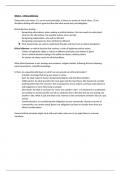Summary
Summary Ethics 2024
- Module
- Institution
- Book
Summary for the Ethics course in the third year of the study programme International Business Administration and the Dutch track Business Administration/ 'Bedrijfskunde'. The summary is written in English and summarizes all lecture materials, knowledge clips and book chapters. Concludingly, everyth...
[Show more]




